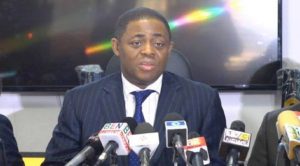
The Minister of Aviation under the Goodluck Jonathan administration, Femi Fani-Kayode has stated that there are five currently holding the destiny of the country.
Fani-Kayode in a video shared on his Twitter account said a compromise has to be reached with the five people, adding that failure to do so might lead to a dangerous situation in the country.
He listed these forces as Sunday Igboho and Gani Adams in the Southwest, Nnamdi Kanu in the Southeast, Obadiah Mailafia in the Middle Belt and President Buhari who represents the north.
The former minister further stated that it is important to meet with these people and make them more understanding.
He added that there is also the need for inclusiveness and adoption of a formula to avoid another war.
Fani-Kayode, however, lamented that there might not be a country for any political elections in two years if politicians keep acting like all is well and the current issues are not resolved.
“I’m seriously worried about what’s going on in Nigeria currently.
“There are four major forces in Nigeria right now. I choose to call them the four horns; two are in the Southwest, one is in the East and the fourth one is Buhari and he represents the North.
“The South West has two very powerful, aggressive, focused and very committed horns and they are Gani Adams and Sunday Igboho. They cannot be stopped, intimated or threatened because they are not politicians.
“There’s Nnamdi Kanu in the Southeast, Obadiah Malifia in Middle Belt and President Buhari in the North.
“These people if not properly handled can lead to the destruction of the country.
“I know a lot of politicians will want to act ad if all is well and normal while they are seriously planning for the 2023 elections and observe who will become President.
“What they fail to understand is that with what is currently going on in the country, there might not be any Nigeria in two years.
“I have been into politics for years now and I have been with politicians but never I have I experienced this level of ethnic nationalism being expressed amongst the Yoruba, Igbo and Middle Belt people as I have today,” he said.
The article was originally published on Nigeria News


